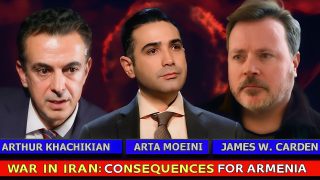If the treaty now being negotiated between Azerbaijan and Armenia results in the surrender of Artsakh – then lasting peace cannot be guaranteed: Peace cannot be guaranteed: Baroness Caroline Cox
Greetings. May I begin by introducing myself very briefly. All I ever say about myself is that I’m actually a nurse and a social scientist by intention, and a baroness by astonishment. I was not into politics. I was the first baroness I had ever met. You wake up one morning, and see a baroness looking at yourself out of the bathroom mirror. It’s quite a shock! But you think, how do I use the privilege of being in the House of Lords, which is what being a baroness gives you, and the idea came very clearly – it’s a wonderful place to be a voice for people whose voices are not heard. And that is how I use my role there, and what a privilege it is, to be able to speak for people whose voices are not heard, such as the people of Artsakh or Nagorno Karabakh, and the people of Armenia, whose voices are not heard as they should be. So that is my privilege, and that is the reason behind the privilege of giving this talk.
To the People of Armenia, the first Christian Nation.
In my many travels to your beloved homeland, I have been inspired and humbled to share personally in your joys and your sorrows. I have been blessed to have met a host of wonderful people, many the direct descendants of victims of the Great Genocide in Anatolia, of anti-Armenian pogroms in Sumgait and Baku, and of ethnic-religious cleansing in Artsakh. I have been struck by the unanimity with which you share a simple common goal. It is to live in peace, dignity and security in your own land.
My dear friends, that longing continues to fill my heart.
Some of you may remember my first visit to Armenia over thirty years ago. It was a time of great uncertainty as the people of (what was then) the Armenian Soviet Socialist Republic fought with courage for democracy and independence, while the Armenians of the Nagorno Karabakh Autonomous Oblast began their valiant campaign for the right to self-determination.
The struggle for Artsakh became the catalyst for independence of the Republic of Armenia. To this day, it remains an important symbol of hope and unity among all Armenians, across every part of the nation and diaspora.
We all remember the horrors of the first Karabakh War and the immense suffering inflicted by Azerbaijan upon your people. Tens of thousands lost their lives while defending their homeland. I personally witnessed 400 Grad missiles fired by Azerbaijan daily raining onto Stepanakert, an aerial bombardment of civilian homes with 500 kilogram bombs. I witnessed the results of massacres, atrocities and forced displacement. And I remember, with great sadness, that when the people of Artsakh called for assistance, the world chose not to listen.
In 2020, Azerbaijan – assisted by Turkey – resumed its attempted conquest of Artsakh with impunity: schools and hospitals were bombed; religious sites destroyed; Armenian hostages tortured, killed and their corpses violated. Dozens of Armenian military and civilian personnel remain in Azerbaijani custody – in contravention of the terms of a carefully-written ceasefire agreement – while Azeri military forces have advanced into the sovereign territories of the Republic of Armenia. The blockade of the Lachin corridor has created a humanitarian catastrophe within Artsakh, whose indigenous Armenian Christian population face the increasing possibility of ethnic and religious cleansing from their historic lands.
And yet, not one nation has responded to the pleas of the Armenian people. Not the United Nations, nor the OSCE, nor United States and its NATO alliance, nor Russia and its CSTO alliance. Not one nation has resisted Baku’s territorial claims over Stepanakert. The question therefore arises: who among the international community would resist Baku’s territorial claims over Yerevan, Lake Sevan or Zangezur? Azerbaijan’s political leadership has made no secret of their strategic objective to seize your homeland. If Artsakh falls, is there a risk that Armenia will follow?
At this critical hour of vulnerability, I and very many others are deeply saddened by reports that the Republic of Armenia is being pressured by international powers to accept Azerbaijan’s sovereignty over Artsakh. In return for a so-called peace treaty and trade agreement, the people of Artsakh – who have already endured so much suffering – would be expected to surrender their international right of self-determination. Over 120,000 indigenous Armenians would become citizens of an anti-Armenian authoritarian state, with an appalling track record of human rights violations. The people of Artsakh would have to concede control over their lives, their liberty and their land. If and when they are forced to leave, which nation would be willing to provide food, water, safe transport and refuge? Who will protect the most vulnerable – people living with disabilities, the elderly, and families with young children?
My friends, without an Armenian Artsakh, the very existence of the Republic of Armenia will become even more endangered than it is today. Recent history has proved that Armenia stands isolated from meaningful international support; even your closest allies have not provided effective responses to the suffering inflicted upon your people.
It is with the heaviest of hearts that we must face the disturbing possibility that the Armenian Genocide never ended. There are those who want to complete it, and those who are unable – or unwilling – to stop it. It is quite possible that what is done to Artsakh will also, in time, be done to the Republic of Armenia.
If the treaty now being negotiated between Azerbaijan and Armenia results in the surrender of Artsakh – then lasting peace cannot be guaranteed. Any such treaty should be submitted for review of the democratically-elected parliaments of Karabakh and Armenia, and not ratified until it is approved in the form of a democratic referendum by the Armenian peoples in these two countries.
At this critical moment in your great nation’s history, it is my hope and prayer that all Armenians – across every part of the nation and diaspora – will continue to uphold the struggle for Artsakh as a symbol of unity. I – along with many others – have faith in your continuing ability to overcome present sufferings with courage, fortitude, sacrifice and love – so that the people of the long-suffering Armenian nation will continue to live in peace and dignity in your own historic lands.
My dear friends, thank you for holding a frontline of faith and freedom for the rest of the world, and for the high price you have paid for doing so.

























